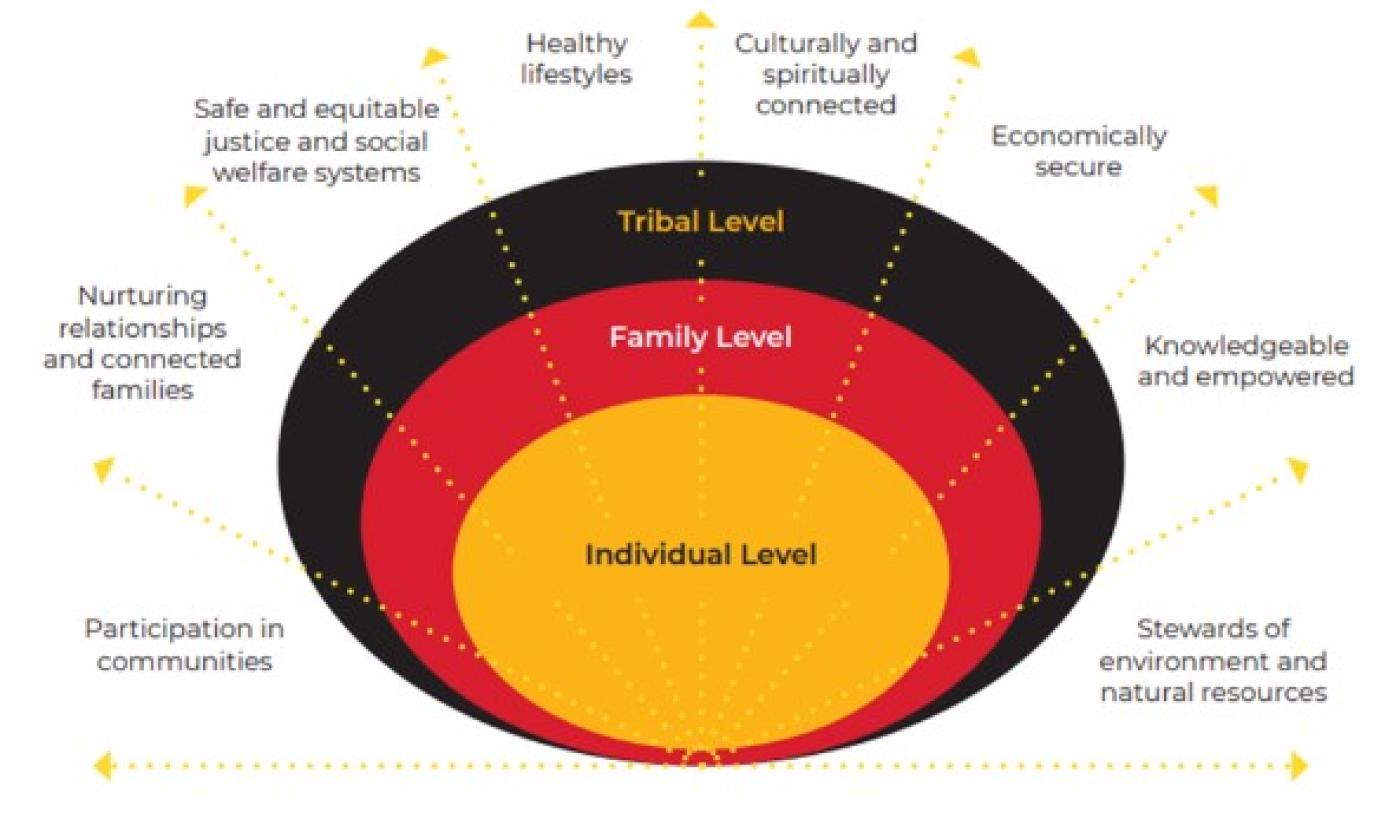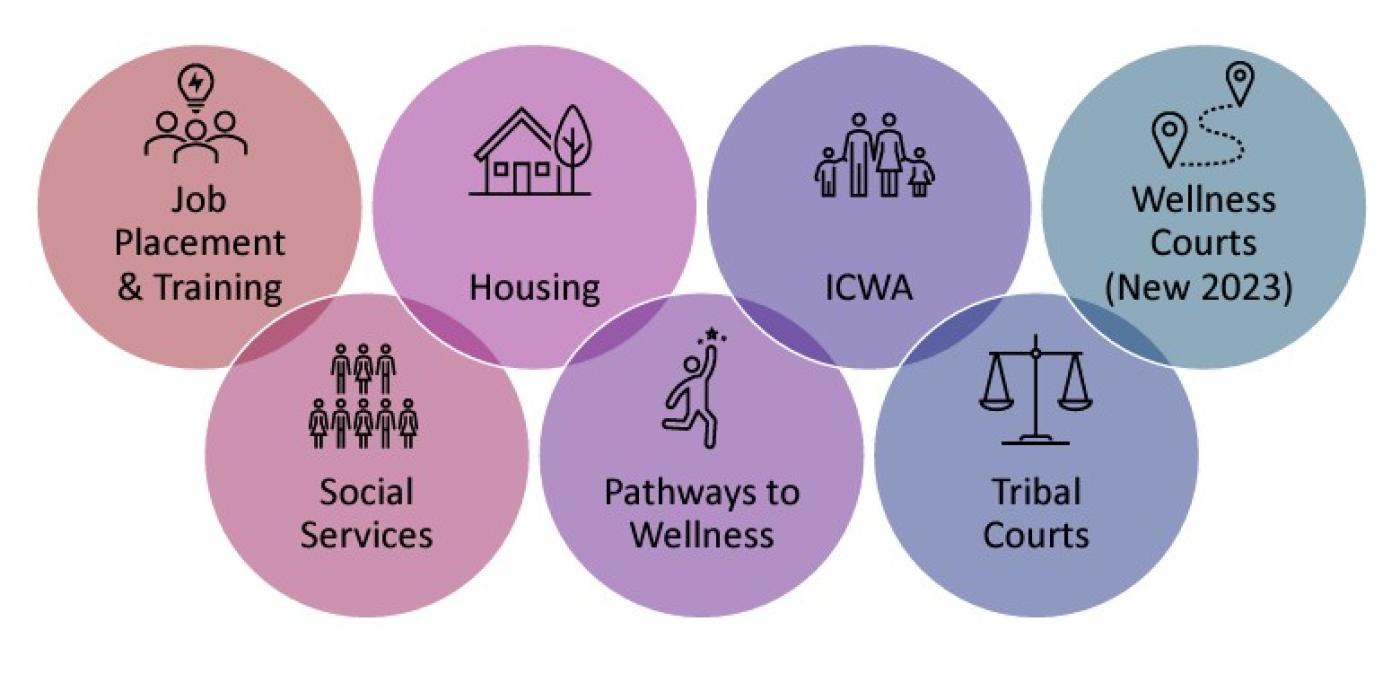Tiwahe is a coordinated service delivery model that increases access to family and social services, creates alternatives to incarceration, improves links to appropriate prevention, intervention and treatment opportunities, improves case management services, and improves partnerships among the available service providers for Tribal children and families.
Tiwahe Purpose and Goals
The root words of Tiwahe provide the foundation for the Initiative. Tiwahe means “family” in the Lakota Language. 'Ti' means house or dwelling, 'Wa' means sacred or pure, like a person’s breath, and 'He' means something that is close.
The home is a sacred space where connectedness and healthy lifestyles are fostered so that families and entire communities may be self-sufficient, prosper, and thrive. Tiwahe fosters collaboration of Tribal services among Tribal programs and with State and Federal partners.
Tiwahe Tribes share the common goals and purpose of the Initiative, but realize the methods, actions, and outcomes in their own way. The BIA works with the Tiwahe Tribes to support families through coordinated service delivery, integrating culture into those services, and reporting successes and challenges to create spaces where these service models can be shared across Indian Country.

Tiwahe is grounded in Tribal values and principles, which guide the goals and objectives of a coordinated service delivery model among agencies and justice systems. This service model:
- Increases access to family and social services,
- Creates alternatives to incarceration via solution-focused sentencing options,
- Improves links to appropriate prevention,
- Provides intervention and treatment opportunities,
- Improves case management services, and
- Improves the overall partnerships among local, tribal, county, state, and federal providers to improve access to services for tribal children, youth, and families
Tiwahe gives the freedom and flexibility to reimagine and build structures that reflect tribal views, approaches, values, and traditions responsive to the communities they serve. A key development for Tiwahe is the collaboration of the six pilot sites undertaking the effort to design a common framework that introduces an outcomes-based performance model to measure success and report the aspirations and progress of tribal communities. The Tiwahe Outcomes Framework acts as a unifying force and common language for tribes to reference success in their work with the Federal Government.
Tiwahe Service Delivery Model
The BIA connects Tribal Nations to seven programs areas of Tiwahe funding. Job placement and training, social services, housing, pathways to wellness, ICWA, Tribal Courts, and Wellness Courts.

Job Placement and Training
This funding is intended to support unemployment and address the shortfall of trained laborers. The job placement and training program represents an integral component of the initiative and offers immediate and long-term benefits of gainful employment that can bring stability and prosperity to the entire family.
Social Services and ICWA
The purpose of the Indian Child Welfare Act (ICWA) is "...to protect the best interest of Indian Children and to promote the stability and security of Indian tribes and families by the establishment of minimum Federal standards for the removal of Indian children and placement of such children in homes which will reflect the unique values of Indian culture... "(25 U.S. C. 1902). ICWA provides guidance to States regarding the handling of child abuse and neglect and adoption cases involving Native children and sets minimum standards for the handling of these cases. The Tiwahe Initiative distributes funding through an across-the-board increase to all eligible Tribes in ICWA and Social Services. This funding distribution increases Tribal ICWA budgets which have remained flat for more than 20 years.
Housing
Tiwahe allows ability to collaborate with other Federal housing programs to increase home ownership, repair and rehabilitation opportunities, and develop strategies for increased energy efficiency and sustainability of new housing on Indian lands.
Tiwahe Housing Improvement Program funds provide a means to addressing the dilapidated and overcrowded housing conditions, foster care housing, transitional housing, temporary housing and emergency shelters in the Tribes’ service area. This funding expanded assistance to single families and veterans.
Pathways to Wellness
Provides an Integrated Service Delivery System of Care
Integrated system of care includes community safety, justice, intervention, treatment and recovery re-entry. These systems encourage individuals to work toward making healthier lifestyle choices.
The BIA is working towards establishing an improved approach for sentencing individuals. This is referred to as Solution-focused Sentencing.
Recidivism is the tendency of a convicted criminal to reoffend, thus BIA believes that by implementing a comprehensive strategy that involves better screening, alternative courts, increased treatment opportunities, probation programs, and critical interagency and intergovernmental partnerships between tribal, state and federal stakeholders, we and our tribal partners will succeed in substantially reducing recidivism in Indian Country.
Learn about the Penobscot Nation’s Healing to Wellness Court
"Treatment Court & ACEs" Episode 7 - Voices of Hope from Reginald Groff III on Vimeo.
Tribal Courts
There are approximately 400 Tribal justice systems throughout the Nation. These courts are partially funded through Public Law 638 Tribal Priority Allocations (TPA). Tribal sovereignty is protected throughout the Tribal justice system or through a traditional court.
The BIA does not manage tribal justice systems, but for Tribes that do not have their own justice system, the Court of Indian Offences (CFR Courts) provide that service on behalf of the Tribe (Title 25 CFR Part 11). There are five Regional CFR Courts.
Tribal Healing to Wellness Courts are restorative justice components of the Tribal Court.


